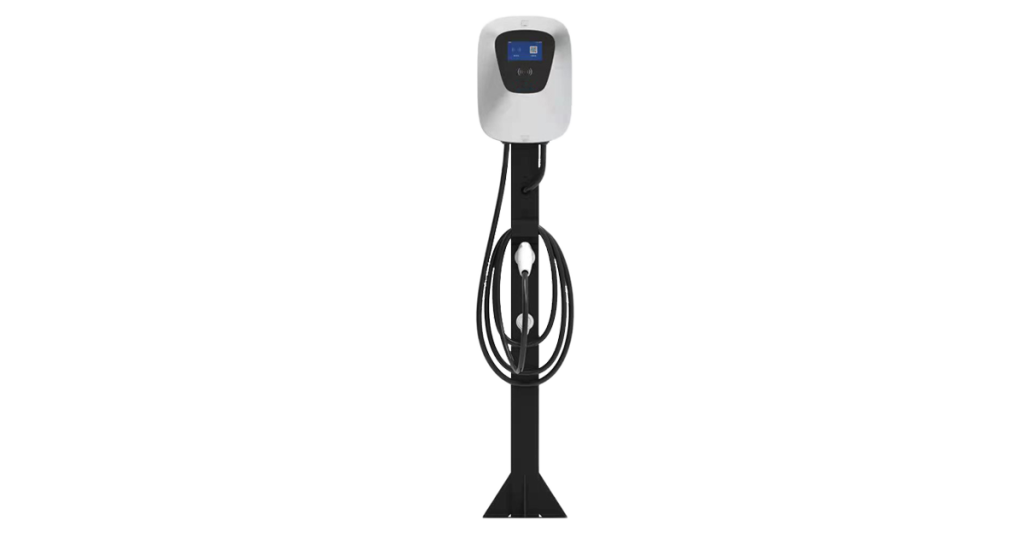
Products
Fast, Reliable, Everywhere

Solutions
Efficient, Innovative EV Charging Solutions.
News
We are committed to the innovation and application of EV charging.
Electric car charger price can vary significantly depending on the model, charging speed, manufacturer, features, installation needs, and other accessories. Here is a rough breakdown of potential price ranges for various types of electric car chargers:
Level 1 Chargers: Level 1 chargers are created to be used with a conventional 120-volt household outlet and are frequently supplied with the purchase of an electric car. Although they provide the slowest charging rates, they are practical for overnight charging. The price of a Level 1 charger can range from $100 to $300 if you need to buy one individually.
Operating at 240 volts and requiring expert installation, Level 2 chargers provide quicker charging than Level 1 chargers. A Level 2 charger can cost anywhere from $400 to $1,500, depending on the charging speed, manufacturer, and other features. The price of installation may vary greatly, raising the price by several hundred to several thousand dollars.
DC fast chargers are perfect for on-the-go charging on longer travels since they offer quick charging at public charging stations. However, their quick charging times and cutting-edge technology make them significantly more expensive. A DC fast charger can cost anywhere between $10,000 and $50,000, not counting installation fees, which can be high.
Electric vehicles (EVs) have significantly increased in popularity in recent years as a result of rising environmental sustainability concerns and the desire to lessen our carbon footprint. The need for electric car chargers is growing along with the demand for EVs. As the globe looks for cleaner and more sustainable transportation choices, the switch to electric vehicles (EVs) is gathering pace. One of the crucial factors to consider as more people switch to EVs is the infrastructure needed to support them, including electric vehicle chargers. Given the huge range in price that electric vehicle chargers may have depending on a number of variables, prospective purchasers may ask if they are worthwhile.
It's crucial to comprehend the many kinds of electric car chargers offered upfront. Level 1, Level 2, and DC rapid chargers may be divided into three categories. The most basic chargers, Level 1 chargers, are frequently included with the car. They offer the slowest charging pace and run on a typical 120-volt home outlet. Faster Level 2 chargers, which run on 240 volts, often need expert installation. They can completely charge an EV overnight and are ideal for usage at home. The quickest alternative is a DC fast charger, which is often accessible in public charging stations. They cost more money, though, and their installation is complicated.
The decision to purchase an electric car charger price may be influenced by installation expenses. Level 2 chargers require more complex electrical work than Level 1 chargers, which may be plugged into existing outlets. Higher installation costs might result from a variety of factors, including the separation between the electrical panel and the charging point, the necessity for trenching to bury wires, and prospective panel improvements. The total cost may also need to be increased by permits and inspections. Getting quotations from certified electricians to correctly estimate these costs is a good idea.

Your charging habits and regular driving patterns are very important when determining if electric car chargers are worth the money. You could discover that you don't need a home charger if you use your car for short commutes and have access to public charging stations. A home charger, however, can offer unparalleled convenience for people who significantly rely on their electric vehicles for everyday commuting or have longer journeys. Making sure your car is prepared to go when you may become a seamless part of your routine by plugging in when you get home.
Additionally, the charger's usefulness is impacted by how quickly it charges. Level 2 chargers drastically shorten charging time for individuals with busy schedules compared to Level 1 chargers. A Level 2 charger can be more tempting if you regularly need to reduce your battery between excursions or have a longer daily commute. Installing an electric car charger may have financial effects beyond just the immediate convenience. Real estate market prices for properties with charging infrastructure may be higher, luring purchasers who are thinking about purchasing electric vehicles. In the long term, this extra value could cover some of the initial installation expenses.
A strong argument for purchasing an electric car charger may also be made through incentives and discounts. Many localities provide financial incentives, tax breaks, or refunds to promote using EVs and charging stations. The cost of installing a home charger may be greatly reduced by looking into the local incentives offered, which will also increase its worth.
Utilizing an electric car charger might result in significant savings over time. Although the initial expenditures might be scary, especially when installation fees are taken into account, the price of energy is substantially lower than that of conventional petrol. As a result, your overall fuel costs may be significantly decreased, providing real financial advantages during the EV's lifetime.
You can decide if the electric car charger price is worthwhile depending on your unique situation and goals. A home charger could be wise if you drive a lot and appreciate the convenience. Before making a choice, it is advised to weigh your charging habits against the initial fees and potential long-term savings. Additionally, remember that the electric car industry is developing and that additional technologies and charging methods may become accessible in the future. PIWIN makes sure that all of our goods are installed properly and are durable so that you can drive without being interrupted by technological problems.
